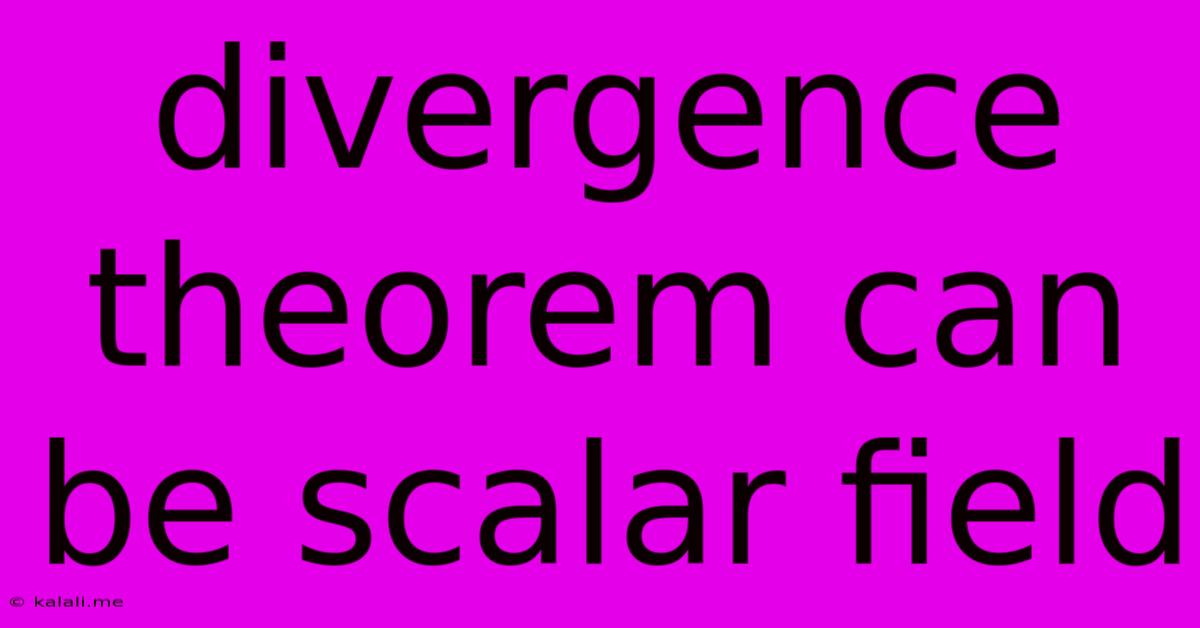Divergence Theorem Can Be Scalar Field
Kalali
Jun 02, 2025 · 3 min read

Table of Contents
Understanding the Divergence Theorem with Scalar Fields
The Divergence Theorem, also known as Gauss's Theorem, is a fundamental concept in vector calculus that relates a surface integral of a vector field to a volume integral of its divergence. While often presented with vector fields, the theorem can be elegantly adapted and understood when applied to scalar fields. This article will explore how the Divergence Theorem works with scalar fields, clarifying its application and implications.
What is the Divergence Theorem? In its standard form, the Divergence Theorem states that the flux of a vector field F through a closed surface S is equal to the volume integral of the divergence of F over the volume V enclosed by S. Mathematically:
∫∫<sub>S</sub> F ⋅ dS = ∫∫∫<sub>V</sub> ∇ ⋅ F dV
Where:
- F is a continuously differentiable vector field.
- S is a closed surface.
- V is the volume enclosed by S.
- dS is the outward-pointing unit normal vector.
- ∇ ⋅ F is the divergence of F.
Extending to Scalar Fields: A Subtle Shift
While the standard formulation uses a vector field, we can adapt the theorem for scalar fields by considering the gradient of a scalar function. Remember that the gradient of a scalar field, ∇φ, is itself a vector field. Therefore, we can substitute ∇φ into the Divergence Theorem equation:
∫∫<sub>S</sub> (∇φ) ⋅ dS = ∫∫∫<sub>V</sub> ∇ ⋅ (∇φ) dV
This seemingly simple substitution has profound implications. Let's break it down:
- ∇φ: The gradient of the scalar field φ represents the direction and magnitude of the greatest rate of increase of φ at each point.
- ∇ ⋅ (∇φ): This represents the Laplacian of φ, denoted as ∇²φ or Δφ. The Laplacian measures the second-order spatial derivatives of φ and signifies how much the function's value differs from its average value in the neighborhood.
The Laplacian and its Significance
The resulting equation, therefore, becomes:
∫∫<sub>S</sub> (∇φ) ⋅ dS = ∫∫∫<sub>V</sub> ∇²φ dV
This form of the Divergence Theorem highlights the relationship between the surface integral of the gradient of a scalar field and the volume integral of its Laplacian. This is particularly useful in various applications:
- Heat Equation: The Laplacian is central to the heat equation, describing the diffusion of heat. This form of the theorem facilitates solving heat transfer problems through different boundary conditions.
- Poisson's Equation: The Poisson equation, ∇²φ = ρ, relates the Laplacian of a scalar potential φ to a source density ρ. The Divergence Theorem allows us to connect the potential on a surface to the source distribution within the volume.
- Electrostatics: In electrostatics, the Laplacian of the electric potential is proportional to the charge density. The theorem becomes essential for calculating electric fields from charge distributions.
Intuitive Interpretation
Imagine φ representing temperature. The surface integral ∫∫<sub>S</sub> (∇φ) ⋅ dS represents the net flow of heat across the surface S. The volume integral ∫∫∫<sub>V</sub> ∇²φ dV represents the total heat sources or sinks within the volume V. The theorem, therefore, states that the net heat flow across the surface is equal to the total heat generated or absorbed within the volume – a powerful statement about conservation of heat.
Conclusion:
While the Divergence Theorem is initially presented using vector fields, its application extends elegantly to scalar fields by considering the gradient. This adaptation, featuring the Laplacian, provides a valuable tool for understanding and solving problems in diverse fields, ranging from physics to engineering. The insights gained from this scalar field perspective enhance the intuitive understanding and practical applicability of this crucial theorem.
Latest Posts
Latest Posts
-
Will Adding A Porch Stop A Basement From Leaking Water
Jun 04, 2025
-
Furnace Blows Cold Air Before Heat
Jun 04, 2025
-
Who Pays A Higher Dividend Voo Or Splg Etf
Jun 04, 2025
-
Old Wine Skin Vs New Wine Skin
Jun 04, 2025
-
Does The Quran Mention The Bible
Jun 04, 2025
Related Post
Thank you for visiting our website which covers about Divergence Theorem Can Be Scalar Field . We hope the information provided has been useful to you. Feel free to contact us if you have any questions or need further assistance. See you next time and don't miss to bookmark.